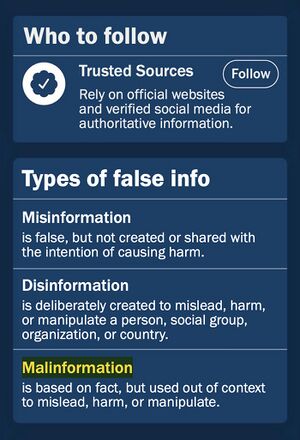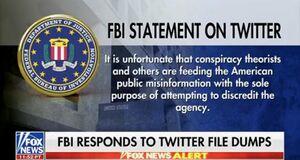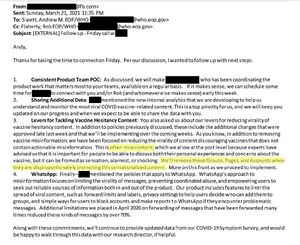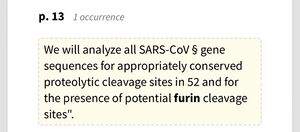Prebunked Malinformation

The concept of "Prebunking Malinformation" suggests a strategy where authorities preemptively target individuals and organizations, including citizens and non-profits, who share information or express skepticism that contradicts official narratives. This approach involves labeling dissenting voices and alternative viewpoints as "malinformation," even if the information being shared is truthful but inconvenient for those in power.
- Preemptive Reputational Destruction: The term "Prebunking" is used to disguise what is essentially a form of preemptive reputational destruction. By preemptively labeling dissenting voices as purveyors of "malinformation," authorities seek to undermine their credibility and reputation before they can gain traction or challenge official narratives effectively. This tactic can have serious consequences for individuals and organizations targeted, including damage to their reputations, social ostracization, or even legal repercussions.
- Targeting Non-state Actors: The use of the term "non-state" by the U.S. Department of State Global Engagement Center implies that the targets of prebunking efforts are in some cases not affiliated with official institutions or foreign state governments. This raises concerns about the misuse of power by authorities to suppress dissent and stifle independent voices within civil society. By targeting individuals and organizations outside of government control, authorities may seek to consolidate their own authority and limit democratic participation and accountability.
- Manipulation of Truth: "Malinformation" can refer to true information that contradicts or casts doubt on official narratives. This highlights the potential for authorities to manipulate the concept of truth to serve their own interests and maintain their grip on power. By labeling inconvenient truths as "malinformation," authorities seek to control the narrative and suppress dissenting viewpoints, regardless of their accuracy or validity.
- Threat to Democracy and Freedom of Expression: The concept of prebunking non-state malinformation poses a significant threat to democracy and freedom of expression. By targeting dissenting voices and alternative viewpoints, authorities undermine the principles of open debate, critical inquiry, and pluralism essential to democratic governance. This can lead to a chilling effect on free speech, self-censorship, and a narrowing of public discourse, ultimately weakening democratic institutions and eroding trust in government.
On X[edit]
2022[edit]
Um. The phrase that pays is likely to be
“Prebunk Malinformation”
Put those 2 ideas together and it means:
“Preemptively Destroy TruthTellers Contradicting Approved Institutional Disinformation-Based Narratives.”
E.g. “We have a virologist who doesn’t buy the pangolin story”
I just saw the word “prebunk” used in regard to “disinformation” & “misinformation”.
The government wants to shut down potential opposing narratives & perspectives before they even exist.
Lol.
Wild dystopian.
“We kinda sorta partially believe in not denying or subverting most elections within reason much of the time even given the circumstances of Russian control, because we believe deeply in fortified democracy through Prebunking malinformation.” Does not seem like a winning slogan.
And I think January 6th was a BIG deal. As was Roe. Etc. But at some point you gotta snap out of the idea that you can run on making good people live in fear that you’re going to ruin their ability to feed their families if they disagree with you. Maybe I’m wrong! We’ll see soon.
“Pre-bunking Malinformation” by the IC.
You’re not allowed to discredit @bariweiss @lhfang @mtaibbi etc. as if they were anti-American operatives just because they told us now exactly how you operate.
How is that part of FBI’s mission??Discrediting factual *SOURCED* reporting??

2023[edit]
Everybody needs to understand the game. We can’t directly target our own citizens tearing down threadbare official statecraft narratives. So destroying our own citizens sharing skepticism, doubt and information becomes “Prebunking non-state malinformation.”
Also known as evil.
The worst offender in US government censorship & media manipulation is an obscure agency called GEC https://state.gov/bureaus-offices/under-secretary-for-public-diplomacy-and-public-affairs/global-engagement-center/
Pre-bunking=Preemptive reputational destruction.
Non-state=Individuals and Organizations including citizens and non-profits.
Malinformation=True things that contradict and cast doubt on gated official narratives.
Fringe/Grifter/Crackpot/Guru/Cringe/Charlatan/Nutter/Con-spiracyTheorist/Bloviating/Ghoul/Jew/Malinformation/Clown-Perspective gains ground.
I really love these swift & devastating cryptic campaigns to discredit everyone who tries thinking in public without government permission.
WSJ: Covid came from a lab https://www.wsj.com/articles/covid-origin-china-lab-leak-807b7b0a
“As you know, we have been focused on reducing the virality of content…[that] is often true content.”
Hence the Prebunking (discrediting/image cheapening) of Malinformation Agents (Those spreading real/true information that contradicts the Gated Institutional Narrative or GIN)!
36."OFTEN TRUE CONTENT" The Virality Project communications mirror those produced in the recent court case Louisiana vs Biden, which showed Facebook admitting to the WHO that it, too, was censoring true content.

I) Disinformation + “Informed Consent” = DISINFORMED Consent.
II) “Malinformation” leading to non-consent lead to “Malinformed Refusal to Consent”.
III) Malinformation & Disinformation were defined by deviation from a *State narrative* based on questionable objectives/science.
1.TWITTER FILES #19
The Great Covid-19 Lie Machine
Stanford, the Virality Project, and the Censorship of “True Stories”

The most powerful disinformation agent was the STATE. That is, the STATE alone decided what was necessary and blocked, intimidated, & tarnished all those scientists, academicians and physicians who attempted to question any part of the official public health narrative. Read this.
The public needed information that was labeled “Malinformation” (that is, actual truth the state finds contradicts its narrative). It got mis/disinformation from Fauci/Collins at NIAID/NIH relabeled as information based on “Noble Lying” widely taught & tolerated in Public Health.
It @mtaibbi is not wrong, we are being disinformed. That is, your consent is disinformed consent which is no consent at all.
Whether you may happen to support this program is irrelevant. The fact that you have neighbors who were disinformed against their will is what matters.
I’m sorry. But this is just terrible. I don’t think we know how bad yet. 🙏
Cc: @noUpside
Because our institutions decided that they outgrew the free society they serve.
What is “Prebunking Malinformation”?
https://www.cisa.gov/sites/default/files/publications/mdm-incident-response-guide_508.pdf https://archive.is/CuoJ7
What is a “Free Speech Zone” to a free people? [Since 1988]
What is a “reputation score” and why am I still throttled?
NEWS: The Twitter team continue to find shadowbans buried deep in the Twitter code.
Just last week they found a measure that stopped accounts assigned a low 'Reputation score' from trending.
This shadowban even applied to Elon's account and prevented his tweets from trending.

What is ESG and how does it work exactly?
NEW: From S&P Global to the London Stock Exchange, tobacco companies are crushing Tesla in the ESG ratings. How could cigarettes, which kill over 8 million a year, be deemed a more ethical investment than electric cars?
One answer: Tobacco’s gone woke.🧵 https://freebeacon.com/latest-news/how-tobacco-companies-are-crushing-esg-ratings/
What is “Controlled Sponteneity”?
Is there a more Orwellian oxymoron among oxymorons?
What was Project DEFUSE? Seriously.
https://www.documentcloud.org/documents/21066966-defuse-proposal/

Why is this so anti-interesting?
Just search on “Furin”, “SARS-CoV” “Spike Protein”, “Wuhan” and “DTRA” for @doddtra. Wouldn’t you **want** deep public hearings if this was all a super unfortunate coincidence? Right??
Coincidence theory puts conspiracy theory to shame.


If you want to understand Trump & RFK, make it very simple. Ignore the errors and issues for a moment. ALL of them. They’re the only 2 major candidates working at the scope of “Maybe almost EVERYTHING important/weird that we’re told by institutions is potentially totally wrong.”
See Also[edit]
- Anechoic Era or Anechoic media
- Anti-Interesting
- Abomination Ratio
- Break-Glass-in-case-of-Emergency People
- Church Committee
- Cobalt and Baby Blue-on-Blue
- Communication Security Complex
- Deaths of Accountability
- Digital Wet-work
- Fact Burning
- Fear, Uncertainty, and Doubt (FUD)
- Follow the Silence
- Free Speech
- Image Cheapening
- Information Asymmetry
- The Invisible World is First Detected by the Visible World’s Failure to Close
- Jessupization
- Kayfabrication
- Law of Gaslighting
- Map the Silences
- Neo-Debunker
- No-Living-Heroes Theory
- Nothing Burger
- Regulated Expression
- Responsible Conspiracy Theorizing
- Seberging
- Steady Hands
- The United States of Absolutely Nothing (U.S.A.N.)
- Tuskegee Principle
- Universal Institutional Betrayal







